- Home
- Jessie Haas
Westminster West Page 3
Westminster West Read online
Page 3
“Is that why you’re leaving, Ed?”
“Is what why? Brr! I’m getting out.” Ed clambered up the bank, his underdrawers hanging in heavy, dripping folds. He picked up his shirt and pants and disappeared behind a bush. Sue chose another bush. “Is what why?” Ed repeated.
“Because—because it’s so dull here!” The shift dropped to her feet. Sue stood shivering in the twilight, hoping to dry off a little before struggling into her dress.
“No, I’m leaving because I love to sing and I can’t be a singer in Westminster West. But I don’t think it’s dull. Do you?”
“It’s easy not to think it’s dull when you’ve spent the last three winters away!” Sue said. Ed laughed. “But really, has anything truly astonishing ever happened here?”
“Susie, you read too many newspapers!” Sue could hear him fighting into his clothes. She let her dress drop over her head, pulled it down where it stuck to her skin, then reached back for the buttons. “Tragic shipwreck!” Ed was intoning. “Train derailment! Man murders wife and children! Western outlaws rob bank!”
“No,” Sue said, “the biggest excitement we’ve had is the barn fires, and we’ll be talking about them for the next hundred years. At least Henry will!”
They started toward the house. The sky was a deep violet now. Far across the cornfield Bright skimmed along, his step as fresh and eager as if he’d stood in his stall all day.
“Mother will say we could have caught a cramp,” Sue said, “and then she’ll say, ‘Wring those wet things out before you hang them up, Sue.’ Doesn’t it ever bother you that you know just what’s going to happen next?”
“But that’s like music,” Ed said. “You can tell where music is going, but that doesn’t mean it’s not beautiful.”
“It doesn’t mean it is, either!”
Ed didn’t say anything more, only whistled softly to him self as they climbed the slope. Mother was just getting down from the buggy. Sue tried to hide her wet shift, but Mother clicked her tongue.
“Swimming right after supper! You could have caught a cramp! Sue, will you—Young man, just what are you laughing about?”
Inside, Ed went to the piano, drawing them all with him. It was nearly eleven when they scattered for bed.
Piano notes echoed in Sue’s head as she slipped between the cool sheets. She reached up to adjust the pillow, and her fingers struck something hard. The red book.
The music had smoothed out Sue’s hot, prickly feelings, but touching the book took her straight back to the attic. She flexed her finger, trying to make it hurt. Then she turned the lamp up brighter and cracked the book open to the first page. It was dated at the top: July 18, 1865.
5
July 18, 1865. Home. Father drove me up from Bratt. this evening. What would he have felt, could he read my thoughts as I sat beside him, silent, behind the slow old horse? The wheels turning, turning, and all through Putney village the houses, lit up and glowing like paper lanterns. Tears came to my eyes. So much beauty, so much peace. It seems impossible that this has been here all this long time.
Yet I am not peaceful. Passing those quiet houses, seeing a woman within, the balance of skirts, dishes on the table, I trembled, and felt myself the Enemy.
Dear old Father’s affection was almost motherly, Mother’s everything a mother’s can be. But so aged—and the house so hot, so full! I was greatly relieved to be free of them after supper, escape to my room, fling open the window and breathe!
I have been longing to see them, so many months. How soon must I see Jane, and will I feel the same?
Jul. 19. Cultivated 3 acres. Father said rest, but of course I could not. His hands shook on the harness buckles, and I could have wept. I walked behind old Pete all day, and with every step I felt I dragged a chain. We have died in our thousands to free the Negro. How many of us have gone home to freedom?
Jul. 20. Cultivated.
Jul. 21. Cultivated and mended harness, helped Father clean out the calf pen. He does not know how to speak to me, nor I to him. He remembers that I have obeyed the orders of captains and majors and doesn’t give orders himself, only timid suggestions. I try to guess what he wants. Found myself longing today for the freedom of the campfire and a tin cup full of Oh Be Joyful.
Wish I did not feel compelled to write this all down. If Mother finds this, I don’t know what it will do to her.
Jul. 22. Church tomorrow. Polished my boots and brushed my coat this evening—trembling as we once did on the eve of battle. But then each of us knew. We laughed and drank and were quiet together—no need to speak of why. Tonight I watched Mother nod over her stitching beside the stove, while Father so carefully polished his boots over a sheet of the Gazette, lest a single drop stain that scrubbed floor. I thought of Dana and Jim Thorne, heading west even now. Would that I were with them!
Jul. 24. Cultivated. Bad headache. Mother knows, I believe, in spite of all my caution. I have seen her eyes on me all day, grieved. Drunken, and on Sunday! I have done worse, but of that she knows nothing.
Jul. 25. Today we mowed, and I was pleased to see Father’s firm, steady step. He worked all day long and seemed as hardened a marcher as I. Indeed I fell behind. My skill is much diminished. He was pleased, I think, to be able to instruct me at last.
Jul. 26. Hall stopped as we sat down to dinner, to say that poor Buxton is returned from Andersonville. It does not seem possible that he can live.
I thought H. looked at me very closely throughout the meal. Louisa is Jane’s dearest friend and I’m sure is often with her just now. I have behaved badly. I know it—perhaps the whole village knows it now. But when I saw her pale face turn toward me, with that mild, sweet expression, I could not bear it. I am no longer worthy. Was I ever? I don’t know, but certainly am not now. My great fear is that I no longer wish to be.
Jul. 27. Terrible. Scything thistle in the sheep pasture with Father—he has let the weeds grow up very much in the past four years. Asters, goldenrod, and thistles very thick—
Again my skill was less than his but not so bad. We worked along in the sun, and the weeds tumbled down over the blade. Was it sweat in my eyes? The weeds as they fell began to look like soldiers. I have seen them fall just like that, as easily. Just as today I scythed weeds, once I scythed men down. I began to see their faces, and all at once I was weeping. When I sobbed aloud, Father turned to see. Then we sat in the shade beside the spring, his arm around my shoulders. But I could tell him little. At last he concluded it was the sun, a weakness brought on by exposure to the Southern climate.
My trouble was contracted in the South, but not from sun. Its very opposite!
Jul. 28. Last night awakened Mother and Father with a loud shout. Dreaming, apparently. I don’t remember.
Jul. 29. Again. Mother greatly distressed, refused to tell me what I had said or in what manner I cried out.
Church again tomorrow. I must do better this time. I learned to face Rebel fire. That was because of the press behind me, the friends around me, each fearing that he would break. I will think of Hall’s eyes upon me—all their eyes. They are all watching.
Jul. 30. Awoke weeping. I dreamed I slept on the battlefield, with my blanket around my ears to drown out the dying groans and the shrieks of the wounded. The dreadful sound, the stench in my nostrils, and the aching knowledge in my heart that some of those groaning were dear friends—yet I must sleep. Mother looked very tired this morning and got a little burn on her hand as she made breakfast.
At the church door I felt very sick. Nearly excused myself. But at the last moment saw Peter Davis in the pew ahead. His head was up in that gallant way he has, yet I knew from our drunken talk last week that he feels much as I do. I marched resolutely past him, and he winked at me! Glad to report that when he proposed a repeat of last week’s debauch, I declined. Eliza Coombs there with her little boy—Tolman’s wound still troubles him very much.
Afterward I was not able to avoid Jane. Her meek, bowed head was a repr
oach to me all through the service. Yet after, when the press brought me near her, she flushed and turned from me sharply. She is angry—and that lightens my heart inexplicably. I spoke a word to her, but she answered very coldly and moved away, leaving me to watch in mingled hurt and satisfaction.
Midnight. Can I settle here, and take up this life again? I must—or perhaps it will kill me. To think that these fields once seemed so wide! All day I felt the hills closing around me, and at evening, when I stood washing at the pump, I thought I saw the broad field before the house filled up with an army. Only it would not accommodate the tenth part of an army! I thought I saw men running through the corn, crushing and trampling it. How the dirt would fly and the valley fill with thunder! All evening in my mind I set defenses around the house, and now I sit up, every sense straining. Insane! A mile away, is Peter sitting up, too? Or does he drink himself to sleep at night? And poor Buxton, lying on his bed—Hall was by; he tells us the poor fellow is just clinging to life—does he, too, keep awake for his watch? Does he hear the clink of the bits, the thud of hooves, as I do?
Imagine—they think we will sink back into our lives as before, court the nice girls we courted once, and settle down to farming! If Mother would only explain to Jane, very kindly and simply, about the screaming and the weeping in the night, if someone would show her the lamp burning long past midnight, it might ease her mind somewhat.
Reverend S. might undertake this for me—a man who understands women. The current incumbent at the parsonage is the third Mrs. S.
July 31. A party up to Hall’s. Peter has felt himself equal to the occasion, and Miss Louisa has got him at last! Awkward—Jane there, and every eye upon us. A similar event was certainly expected on our account, only a few years ago. Jane has passed those years unchanged. I do think her as good and lovely as ever. But as for myself—I actually blush when I consider the kind of thing I once said to her, the easy, gushing sentiment. I feel I might be the grandfather of that boy—and I want nothing more than to kick him in the pants, burn down house, barn, and crops, and head for the West!
What is Jane intending? I thought she flirted with Goodhue in hopes of reawakening my feelings, but perhaps I flatter myself. He is a widower, well established—land poorer than this, and his farming practices antiquated, but she may not care for that. But so stooped and grizzled. I actually shuddered when I thought of them together. I at least am whole in body and not disgusting to look on—so I’ve been told! Perhaps J. can see within, however. Her eyes are more piercing than I ever thought them. Who knows—perhaps she would jilt me, if given the chance.
Aug. 1. Throat ached half the day. I dreamed of us stacking arms, when we were mustered out of the army. Apparently I did not weep aloud, for no questions this morning, and no grieved looks. Helped Mother haul water for the washing, and one of Allen’s girls came up to work with her, as she’s been doing since Laura married. Since I have added my own clothing and linen to this burden, perhaps I should contribute a wife to help bear it. Mother quite exhausted at the end of the day. I demonstrated my skill at rough-and-ready cooking and made an evening meal that horrified her.
Aug. 2. Old Spot calved this noon, needed some assistance. Thought I would actually faint at the sight. The blood and the groans—I was back on the battlefield, holding Gage in my arms as he died, watching someone’s head blown off. Who was that? I can’t remember, except that I did know him, and I never wept a tear, just charged on with all the rest. Already I can hardly comprehend how we did that, but I remember that I did not fear. In action fear vanishes. Mother would say I saved it up for later!
The calf this evening was curled up like a dog, her red coat shining. Looked so new and lovely that tears came to my eyes.
Aug. 3. The Reverend S. and his wife dined with us today. The courage of these women to keep on wedding him. More certain death than in any charge I ever saw—100% losses to date!
Walked with me afterward, to smoke a pipe of sweet tobacco and talk. He tried very gently to draw me out—sent on Jane’s behalf? I found it impossible to respond. He is good and intelligent, and I do respect him, but he, like all the rest, is trying to squeeze me back into the old mold. I have expanded beyond it—for ill as well as good. I’ve been enlarged, and the changes hardened into my nature by searing fire. That is the whole of my problem, and he bears some responsibility, for it was his zeal, his preaching that sent us all forth.
He tells me there is some talk of Jane going West. She has taught school here and could do it there—but does she understand the dangers?
Aug. 4. Thought of the West continually today. A soldier can get land out there for almost nothing.
But I have land here, good land. Here or there I’ll be hitched to the same plow. More sensible to stay where I don’t have to bust sod and fight Indians.
Long argument this evening with Father on the subject of fertilizers. He has kept up well with the times in his use of equipment, I’ll grant, but he hasn’t an idea in the world about fertilizer! Mother sat and smiled over her knitting. When I questioned her, she said, “Go on, dear. It’s as good as a play.”
Aug. 5. Dreaming again. They were charging us and we were firing. My rifle worked more smoothly and swiftly than ever in life. It smoked and bucked in my hands. I saw the red blossom on their faces, on their coats and shirts—fewer and fewer of them to come on, until finally none were left. We stood up from our guns, we looked, and we were all weeping. “Aren’t there any more?” I asked. “Won’t they come again?” But all of them lay dead on the field; there was no movement in the trees to show us an army remained.
Aug. 6. Church again. Old Cynthia Tuthill died this morning—Rev. S. attended the deathbed, came in late and disheveled to service. They will bury her tomorrow afternoon. Came on to rain this evening, looks as if it will rain all night.
August 7. “What do you think I am?” Jane turned at her gate and asked me that, with such an expression—I am utterly bewildered, must go back and find my way through the afternoon, step by step.
After dinner we washed and put on church clothes, drove to the village for Cynthia Tuthill’s service. I kept thinking of all the poor fellows shoveled into southern holes with hardly a word said over them. Old lady Tuthill’s single death barely crossed my mind.
Stayed at the back of the crowd, but the sound of shoveling still reached me. When we all turned away, somehow Jane was beside me. Accident, her design, a conspiracy of the entire village? I hardly know, but I felt I must escort her home. She had walked, of course; her parents, both infirm now, came in the buggy.
It felt impossible to speak at first. Nothing could have been more public. Her veil hid her face, but I felt she was not lifting her eyes to notice me.
At last I thought I might put her expectations to rest, assure her that the fault lay all with me. I stammered out a few words—I hardly know what: dreams, the nervous strain, a mental confusion that made me unfit for female society. She listened to me in the most appalling silence. Then we reached their front gate. She opened the latch, I thought she would go inside without a word. But she turned as if she must speak, pushing back her veil. Her face so fierce that I really did jump. “What do you think I am?” she asked me. And not waiting for an answer, she swept inside and positively slammed the door.
The clock has just tolled one.
“What do you think I am?”
Downstairs the clock tolled one.
The sound spread a long, slow shiver down Sue’s back and through the silent house. The curtains stirred at the window, and the breeze smelled like rain. “What do you think I am?” She turned the page. There must be more. It couldn’t end here.
But all the remaining pages were blank. “What do you think I am?” and then nothing, as if that question had so puzzled the writer that it suspended all other thoughts.
She turned back to the beginning. Her fingers trembled, making the stiff old paper rattle. She saw a ridge near the spine of the book, remnant of earlier pages tha
t had been neatly sliced out with a knife. The short ends of the pages were flecked with brown ink, spattered with the beginnings of words. “I,” she read, and “br,” “sh,” “G,” “L.” What she had just read had to be hidden. What had come before must have been even worse; it was destroyed.
The lamplight made a warm yellow circle that included most of the room. But the corners were deeply shadowed, and black shadows at the edge of every object—chair, washstand, closet door—seemed to add an extra dimension. Sue could feel her heartbeat rock her body: bump-bump, bump-bump.
Everything she’d known all day was not true. The uniform and wedding dress embracing in the trunk; the gallant young soldier and the maid who waited for him—they were not the real story, just as the sad, sweet songs they’d sung this evening and the war reminiscences in the newspaper were not real. They were like the pictures in Harper’s, where all the horses’ legs moved in unison, like the fashion models in Godey’s, with waists as thin as their necks.
What else was not true?
Father. Second selectman, prominent and solid citizen of Westminster West. Father, the embodiment of the town, as much as any Goodhue or Harlow or Alfred Stevens himself. Father, the man of few and plain words. Father, as prosaic as a salt shaker …
Father, who had wanted only to leave, “… burn down house, barn, and crops.” Wept at the sight of a new red calf. Drank on Sunday. Tried to jilt his sweetheart.
With a sigh and a whisper the rain started. The lamp began to run out of oil. The circle of light contracted, and the shadows in the corners grew. Then with a little gasp the flame puffed out. The room went black, and the silvery gauze curtains shifted and stirred.

 Chase
Chase The Sixth Sense
The Sixth Sense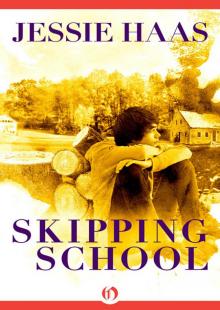 Skipping School
Skipping School Keeping Barney
Keeping Barney Unbroken
Unbroken Westminster West
Westminster West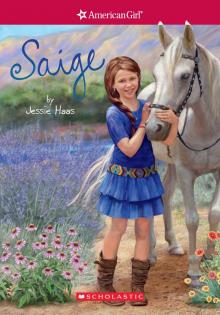 Saige
Saige Beware the Mare
Beware the Mare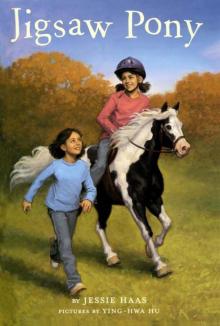 Jigsaw Pony
Jigsaw Pony Rescue
Rescue Saige Paints the Sky
Saige Paints the Sky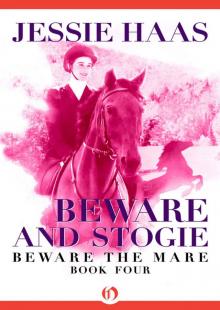 Beware and Stogie
Beware and Stogie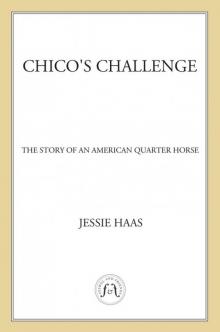 Chico's Challenge
Chico's Challenge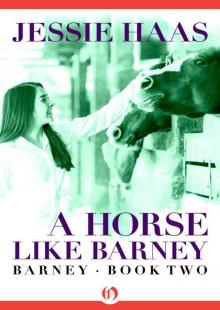 A Horse like Barney
A Horse like Barney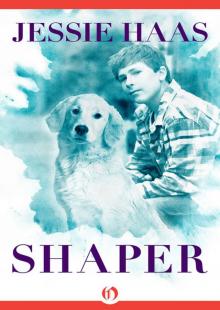 Shaper
Shaper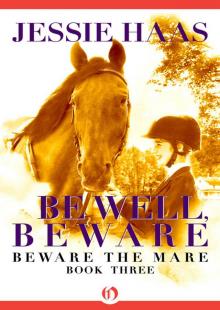 Be Well, Beware
Be Well, Beware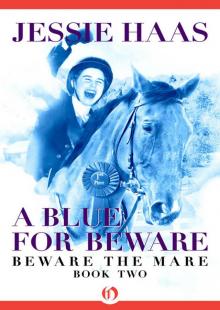 A Blue for Beware
A Blue for Beware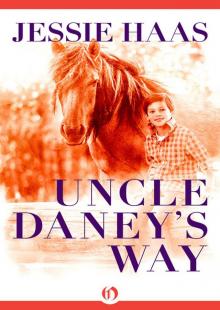 Uncle Daney's Way
Uncle Daney's Way